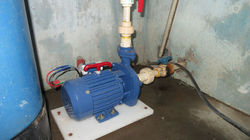Reverse Osmosis System ~ Salavankuppam, India
 |  |  |  |  |
|---|---|---|---|---|
 |  |  |  |  |
 |  |  |  |  |
Salavankuppam is a small village/hamlet located on the outskirts of Mamallapuram, Tamil Nadu, India. The village is located on the shores of the Bay of Bengal and suffered severe damage from the December 26, 2004 Indian Ocean tsunami which caused flooding in the village. The already toxic state of the fresh water available in Salavankuppam deteriorated even further after the infiltration of salt water from the sea. After the tsunami struck, a reverse osmosis system was installed in Salavankuppam to provide residents with clean, purified water however after 10+ years of constant use the system had completely worn out, was non-operational and was using somewhat obsolete technology. Working with Curt Degler of Save Int'l, WaterBridge Outreach provided funds for a complete restoration of the reverse osmosis system. The photos above show some of the work that was done including:
- two new motors with high pressure pump and high powered motor,
- two new reverse osmosis membranes with a life expectancy of ten years (old ones are shown in corner of photo)
- new sand and activated charcoal filter packing for the big blue tanks as well as new valves (the old ones cracked after ten years of pressure and heat)
- buffering filter (made in Italy)
- two new cartridge filters.
Curt reports to us that the restoration project has been a complete success and is now the source of his own drinking water so he can attest to its quality! As time goes on the most important issue will be maintenance - so often a problem with the water systems installed by outside organizations in areas of the developing world. In Tamil Nadu we are, as far as possible and together with Save Int’l, building maintenance into our water programs to try to ensure lasting long term impacts. The photos above include images of Curt, the contractor Muralidharan and Salavankuppam resident Parvati who has been trained to be the system operator.
At WaterBridge Outreach, what is distinctive is that – project by grassroots project and working alongside others with local knowledge - we see our work with books and literacy as going hand-in-hand with what we aim to do in terms of clean water and sanitation. The latter is an essential part of the infrastructure that allows education. That in turn will enable the villagers and young people themselves to serve and develop their own communities.













